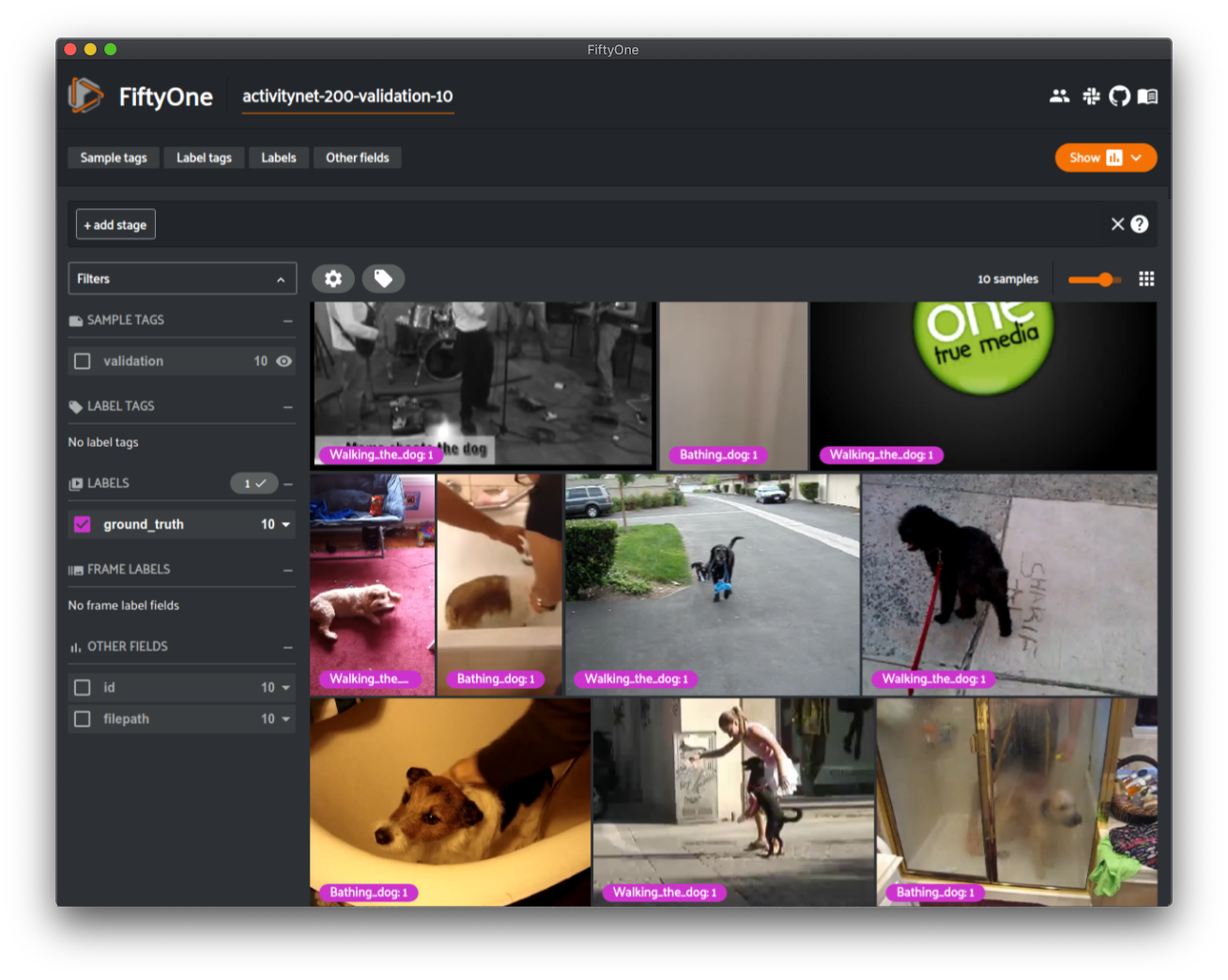ActivityNet 200#
ActivityNet is a large-scale video dataset for human activity understanding supporting the tasks of global video classification, trimmed activity classification, and temporal activity detection.
This version contains videos and temporal activity detections for the 200 class version of the dataset.
Note
Check out this guide for more details on using FiftyOne to work with ActivityNet.
Notes
ActivityNet 200 is a superset of ActivityNet 100
ActivityNet 100 and 200 differ in the number of activity classes and videos per split
Partial downloads will download videos (if still available) from YouTube
Full splits can be loaded by first downloading the official source files from the ActivityNet maintainers
The test set does not have annotations
Details
Dataset name:
activitynet-200Dataset source: http://activity-net.org/index.html
Dataset license: CC-BY-4.0
Dataset size: 500 GB
Tags:
video, classification, action-recognition, temporal-detectionSupported splits:
train, validation, testZooDataset class:
ActivityNet200Dataset
Full split stats
Train split: 10,024 videos (15,410 instances)
Test split: 5,044 videos (labels withheld)
Validation split: 4,926 videos (7,654 instances)
Partial downloads
FiftyOne provides parameters that can be used to efficiently download specific subsets of the ActivityNet dataset to suit your needs. When new subsets are specified, FiftyOne will use existing downloaded data first if possible before resorting to downloading additional data from YouTube.
The following parameters are available to configure a partial download of
ActivityNet 200 by passing them to
load_zoo_dataset():
split (None) and splits (None): a string or list of strings, respectively, specifying the splits to load. Supported values are
("train", "test", "validation"). If none are provided, all available splits are loadedsource_dir (None): the directory containing the manually downloaded ActivityNet files used to avoid downloading videos from YouTube
classes (None): a string or list of strings specifying required classes to load. If provided, only samples containing at least one instance of a specified class will be loaded
max_duration (None): only videos with a duration in seconds that is less than or equal to the
max_durationwill be downloaded. By default, all videos are downloadedcopy_files (True): whether to move (False) or create copies (True) of the source files when populating
dataset_dir. This is only relevant when asource_diris providednum_workers (None): the number of processes to use when downloading individual videos. By default,
multiprocessing.cpu_count()is usedshuffle (False): whether to randomly shuffle the order in which samples are chosen for partial downloads
seed (None): a random seed to use when shuffling
max_samples (None): a maximum number of samples to load per split. If
classesare also specified, only up to the number of samples that contain at least one specified class will be loaded. By default, all matching samples are loaded
Note
See
ActivityNet200Dataset and
ActivityNetDatasetImporter
for complete descriptions of the optional keyword arguments that you can
pass to load_zoo_dataset().
Full split downloads
Many videos have been removed from YouTube since the creation of ActivityNet. As a result, if you do not specify any partial download parameters defined in the previous section, you must first download the official source files from the ActivityNet maintainers in order to load a full split into FiftyOne.
To download the source files, you must fill out this form.
Refer to this page to see how to load
full splits by passing the source_dir parameter to
load_zoo_dataset().
Example usage
1import fiftyone as fo
2import fiftyone.zoo as foz
3
4#
5# Load 10 random samples from the validation split
6#
7# Only the required videos will be downloaded (if necessary)
8#
9
10dataset = foz.load_zoo_dataset(
11 "activitynet-200",
12 split="validation",
13 max_samples=10,
14 shuffle=True,
15)
16
17session = fo.launch_app(dataset)
18
19#
20# Load 10 samples from the validation split that
21# contain the actions "Bathing dog" and "Walking the dog"
22#
23# Videos that contain all `classes` will be prioritized first, followed
24# by videos that contain at least one of the required `classes`. If
25# there are not enough videos matching `classes` in the split to meet
26# `max_samples`, only the available videos will be loaded.
27#
28# Videos will only be downloaded if necessary
29#
30# Subsequent partial loads of the validation split will never require
31# downloading any videos
32#
33
34dataset = foz.load_zoo_dataset(
35 "activitynet-200",
36 split="validation",
37 classes=["Bathing dog", "Walking the dog"],
38 max_samples=10,
39)
40
41session.dataset = dataset
#
# Load 10 random samples from the validation split
#
# Only the required videos will be downloaded (if necessary)
#
fiftyone zoo datasets load activitynet-200 \
--split validation \
--kwargs max_samples=10
fiftyone app launch activitynet-200-validation-10
#
# Load 10 samples from the validation split that
# contain the actions "Archery" and "Cricket"
#
# Videos that contain all `classes` will be prioritized first, followed
# by videos that contain at least one of the required `classes`. If
# there are not enough videos matching `classes` in the split to meet
# `max_samples`, only the available videos will be loaded.
#
# Videos will only be downloaded if necessary
#
# Subsequent partial loads of the validation split will never require
# downloading any videos
#
fiftyone zoo datasets load activitynet-100 \
--split validation \
--kwargs \
classes=Archery,Cricket \
max_samples=10
fiftyone app launch activitynet-100-validation-10
Note
In order to work with video datasets, you’ll need to have ffmpeg installed.
